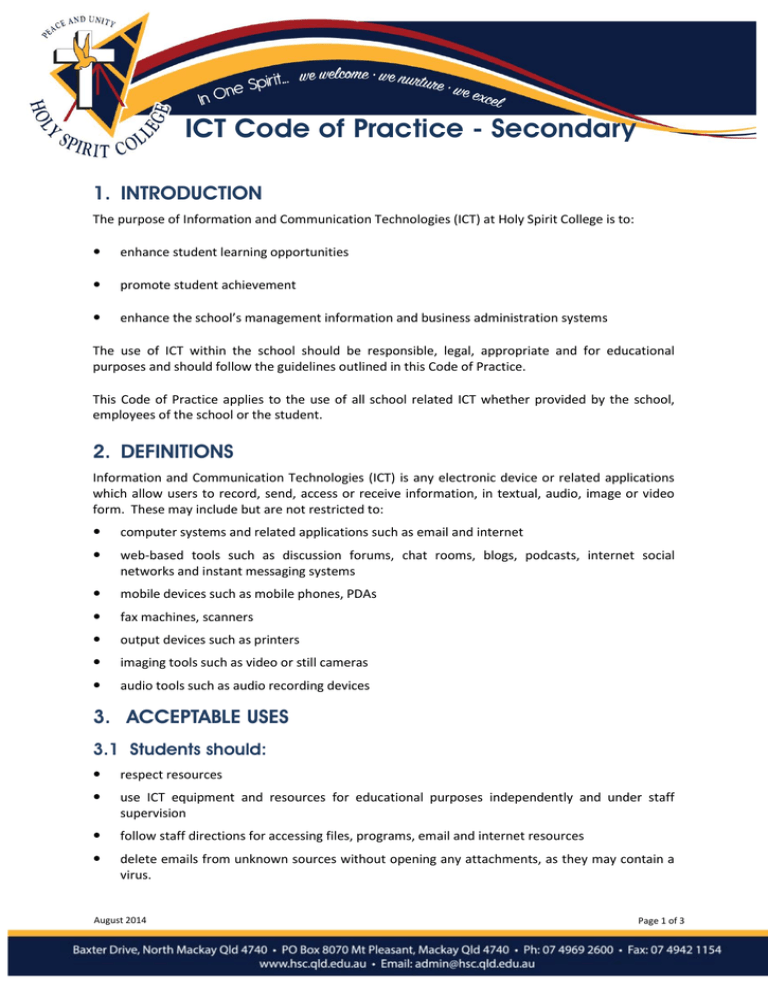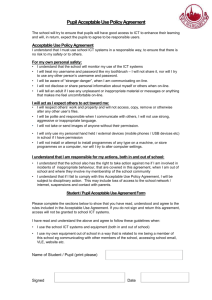ICT Code of Practice - Secondary
advertisement

ICT Code of Practice - Secondary 1. INTRODUCTION The purpose of Information and Communication Technologies (ICT) at Holy Spirit College is to: enhance student learning opportunities promote student achievement enhance the school’s management information and business administration systems The use of ICT within the school should be responsible, legal, appropriate and for educational purposes and should follow the guidelines outlined in this Code of Practice. This Code of Practice applies to the use of all school related ICT whether provided by the school, employees of the school or the student. 2. DEFINITIONS Information and Communication Technologies (ICT) is any electronic device or related applications which allow users to record, send, access or receive information, in textual, audio, image or video form. These may include but are not restricted to: computer systems and related applications such as email and internet web-based tools such as discussion forums, chat rooms, blogs, podcasts, internet social networks and instant messaging systems mobile devices such as mobile phones, PDAs fax machines, scanners output devices such as printers imaging tools such as video or still cameras audio tools such as audio recording devices 3. ACCEPTABLE USES 3.1 Students should: respect resources use ICT equipment and resources for educational purposes independently and under staff supervision follow staff directions for accessing files, programs, email and internet resources delete emails from unknown sources without opening any attachments, as they may contain a virus. August 2014 Page 1 of 3 ICT Code of Practice - Secondary 3.2 Respect others Respect the rights, beliefs and viewpoints of others. Follow the same standards of behaviour online as one is expected to follow in real life. Observe Copyright rules by respecting the information, ideas and artistic works of others by acknowledging the author or publisher of information from the internet and not claiming the work or pictures as your own. 3.3 Keep yourself safe online at school Keep passwords and personal work secure. If it is suspected that a password has been compromised, steps must be taken to change the password immediately. Use the internet and email for educational purposes. Use school email accounts, not personal accounts, when communicating online at school. 4. UNACCEPTABLE USES 4.1 Personal Safety Disclosure of personal information can expose users to inappropriate material, physical danger, unsolicited commercial material, financial risks, harassment and bullying, exploitation, unreliable information, nuisance and sabotage. You should NOT: send or post detailed personal information, images or audio about yourself or other people (Personal contact information includes home address, telephone or mobile number, school address or work address.) publish email addresses to public sites meet with someone you have met online without your parent's/guardian’s approval and participation. 4.2 Illegal Activities Students need to be aware that they are subject to laws including those governing assault, trafficking and computer offences. An electronic audit trail may provide evidence of offences. 4.3 Network Security You should NOT: provide your password to another person go looking for network security access, because this may be seen as an attempt to gain unauthorised access to the network August 2014 Page 2 of 3 ICT Code of Practice - Secondary post information that, if acted upon, could cause damage to or disrupt the network open emails from unknown sources. 4.4 Inappropriate Language Restrictions against ‘inappropriate language’ apply to public messages, private messages, and material posted on web pages. Messages sent using the school’s ICT are recorded, monitored and scanned. 4.5 Respect for Privacy and Others You should NOT: distribute private information, including email, photos or recordings, about another person without their permission take photos, sound or video recordings of people, including background figures and voices, without their permission make personal attacks on another person harass another person (Harassment is persistently acting in a manner that distresses or annoys another person. If someone tells you to stop sending them messages, you must comply with their request.) send or post any inappropriate or inaccurate information, comments, images, video or audio about other people, the school or other organisations send or post personal information about other people without their permission. 4.6 Access to Inappropriate Material Attempts to access inappropriate material using the school’s ICT is monitored and logged by the school or the Diocesan Catholic Education Office. Some inappropriate material may be filtered or blocked by the school or Diocesan Catholic Education Office. 5. CONSEQUENCES OF IMPROPER USE Any user violation will be recorded and may be subject to the following consequences: loss of access privileges for a period of time informing parents/guardians suspension or termination of enrolment legal action. August 2014 Page 3 of 3


